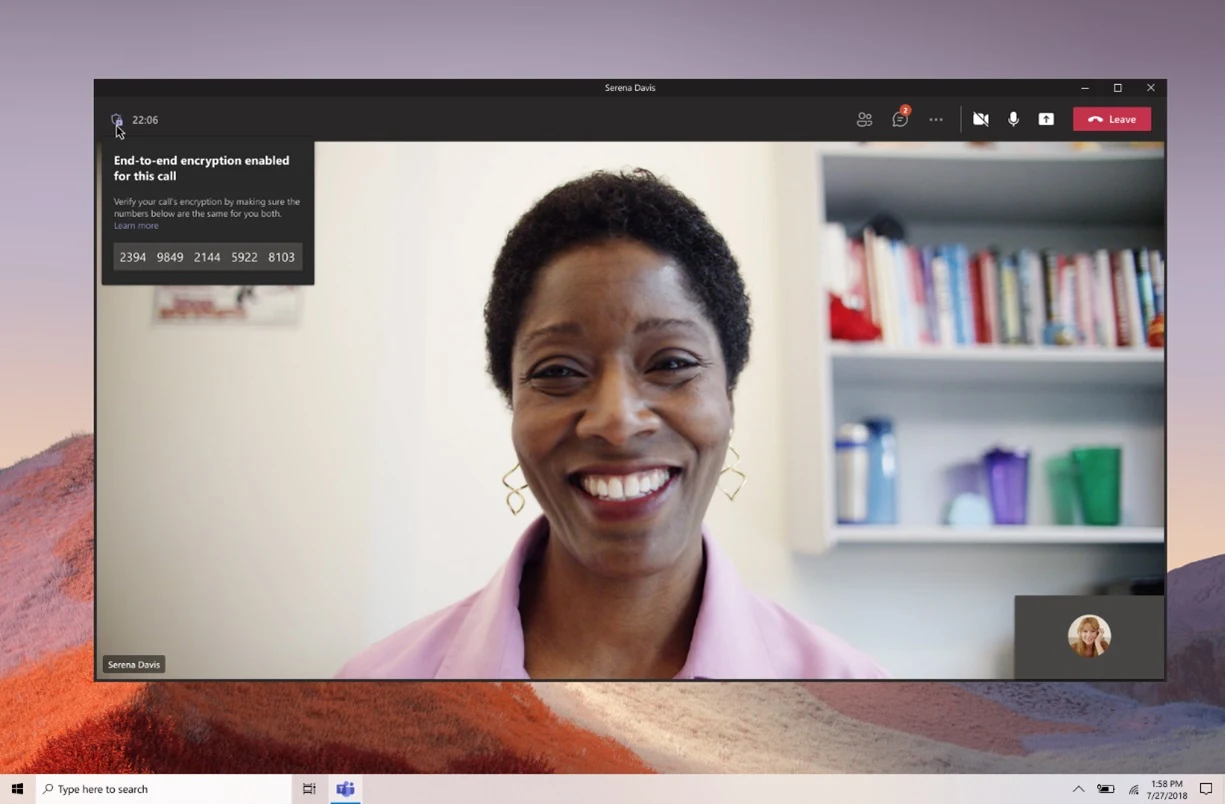Microsoft has recently announced that it has incorporated end-to-end encryption across all calls made on the Microsoft Teams platform.
This new development was actually noted by TheVerge magazine before Microsoft got around to commenting on it. However, comment they did and it’s official: calls across the social media video conferencing application Teams are now that much more secure due to the incorporation of end-to-end encryption technology. I’m sure there are some readers that seem to be recognizing this term, but can’t quite place where it’s from. Well, the answer to that is WhatsApp. The Meta-owned platform often informs users about its end-to-end encryption practices in order to both show off security measures and assure users that their messages are safe on the platform. Such assurances also multiplied for the site when the entire WhatsApp policy fiasco happened back in early 2021, which also brought a lot of unnecessary attention on end-to-end encryption and how useful it really is.
So, let’s stop the clocks and discuss what this new terminology really means. Just the word end-to-end encryption has probably clued users into the fact that it’s a form of scrambling data to make sure that outside parties can’t read one’s personal messages. End-to-end encryption essentially just encodes data being transferred between two communicating parties, and then swallows the deciphering code so no one else can access it. Therefore, theoretically, messages are only accessible by the communicating parties, with not even their host platform being able to read them. Theoretically, that is, because it has been speculated by other platforms that WhatsApp’s end-to-end encryption may not be the most structurally sound.
WhatsApp provides users with the ability to save their past messages by uploading them onto Google Drive. This way, when a new phone is procured, all previous conversations and chat media can catch back up onto the new device. However, these backups are very much accessible by WhatsApp, which therefore means that end-to-end encryption has successfully been bypassed. But what does that spell for Microsoft Teams?
It’s a bit too early to tell, really, since the only comment that Microsoft has passed on its encryption is that its activation will disable a few other features for users. Those include recordings, call transfers, group calls, and live captions. Which, honestly, bodes very well for the platform, since WhatsApp’s entire problem was having an accessible storage bank of all user data. Microsoft seems to be forcibly turning off any and all storage capabilities in order to maintain the integrity of its encryption.
Read next: A Survey Reveals That Employees In The Cybersecurity Field Are Exposing Businesses To Potential Harm Due To Burnout
This new development was actually noted by TheVerge magazine before Microsoft got around to commenting on it. However, comment they did and it’s official: calls across the social media video conferencing application Teams are now that much more secure due to the incorporation of end-to-end encryption technology. I’m sure there are some readers that seem to be recognizing this term, but can’t quite place where it’s from. Well, the answer to that is WhatsApp. The Meta-owned platform often informs users about its end-to-end encryption practices in order to both show off security measures and assure users that their messages are safe on the platform. Such assurances also multiplied for the site when the entire WhatsApp policy fiasco happened back in early 2021, which also brought a lot of unnecessary attention on end-to-end encryption and how useful it really is.
So, let’s stop the clocks and discuss what this new terminology really means. Just the word end-to-end encryption has probably clued users into the fact that it’s a form of scrambling data to make sure that outside parties can’t read one’s personal messages. End-to-end encryption essentially just encodes data being transferred between two communicating parties, and then swallows the deciphering code so no one else can access it. Therefore, theoretically, messages are only accessible by the communicating parties, with not even their host platform being able to read them. Theoretically, that is, because it has been speculated by other platforms that WhatsApp’s end-to-end encryption may not be the most structurally sound.
WhatsApp provides users with the ability to save their past messages by uploading them onto Google Drive. This way, when a new phone is procured, all previous conversations and chat media can catch back up onto the new device. However, these backups are very much accessible by WhatsApp, which therefore means that end-to-end encryption has successfully been bypassed. But what does that spell for Microsoft Teams?
It’s a bit too early to tell, really, since the only comment that Microsoft has passed on its encryption is that its activation will disable a few other features for users. Those include recordings, call transfers, group calls, and live captions. Which, honestly, bodes very well for the platform, since WhatsApp’s entire problem was having an accessible storage bank of all user data. Microsoft seems to be forcibly turning off any and all storage capabilities in order to maintain the integrity of its encryption.
Read next: A Survey Reveals That Employees In The Cybersecurity Field Are Exposing Businesses To Potential Harm Due To Burnout

